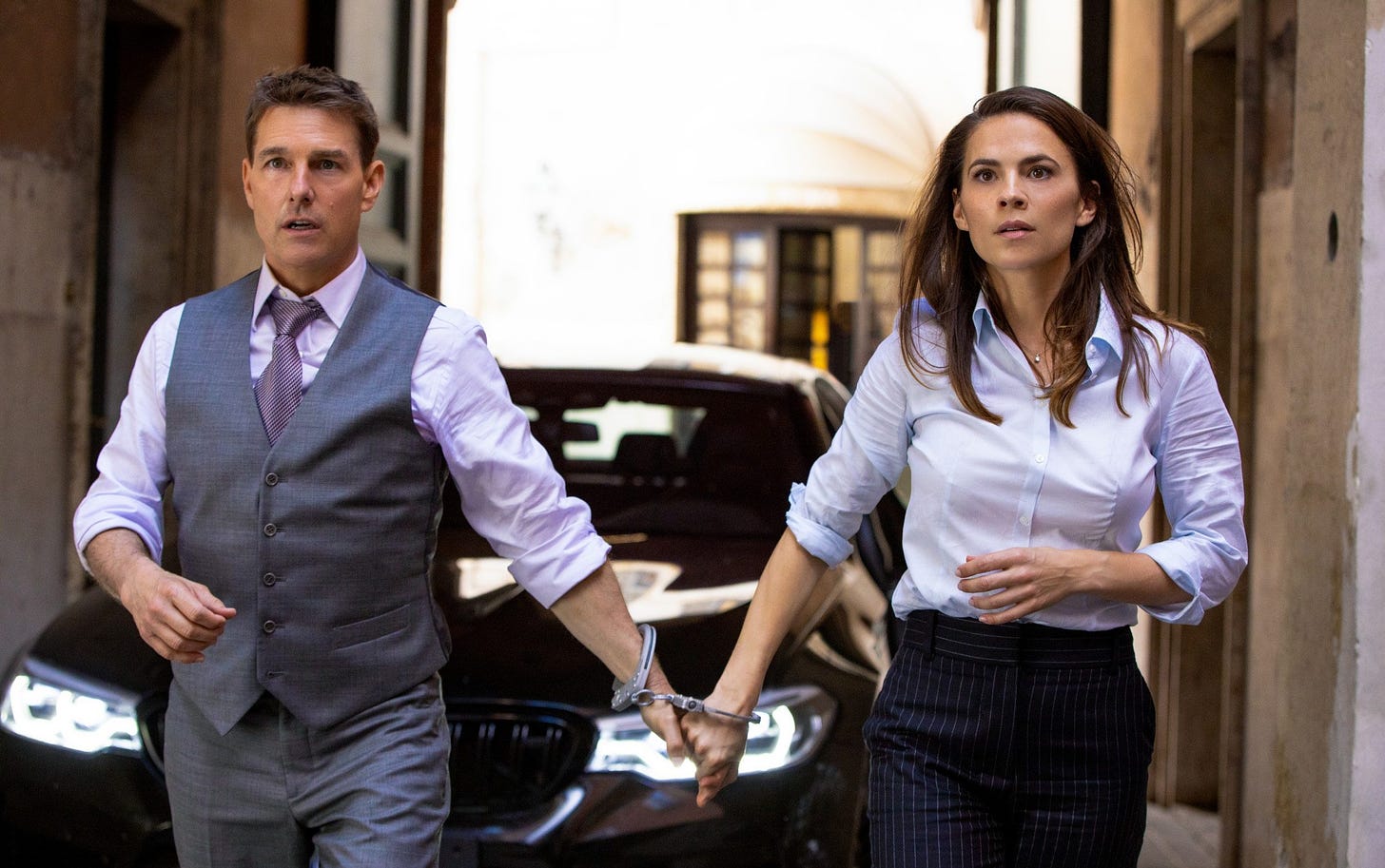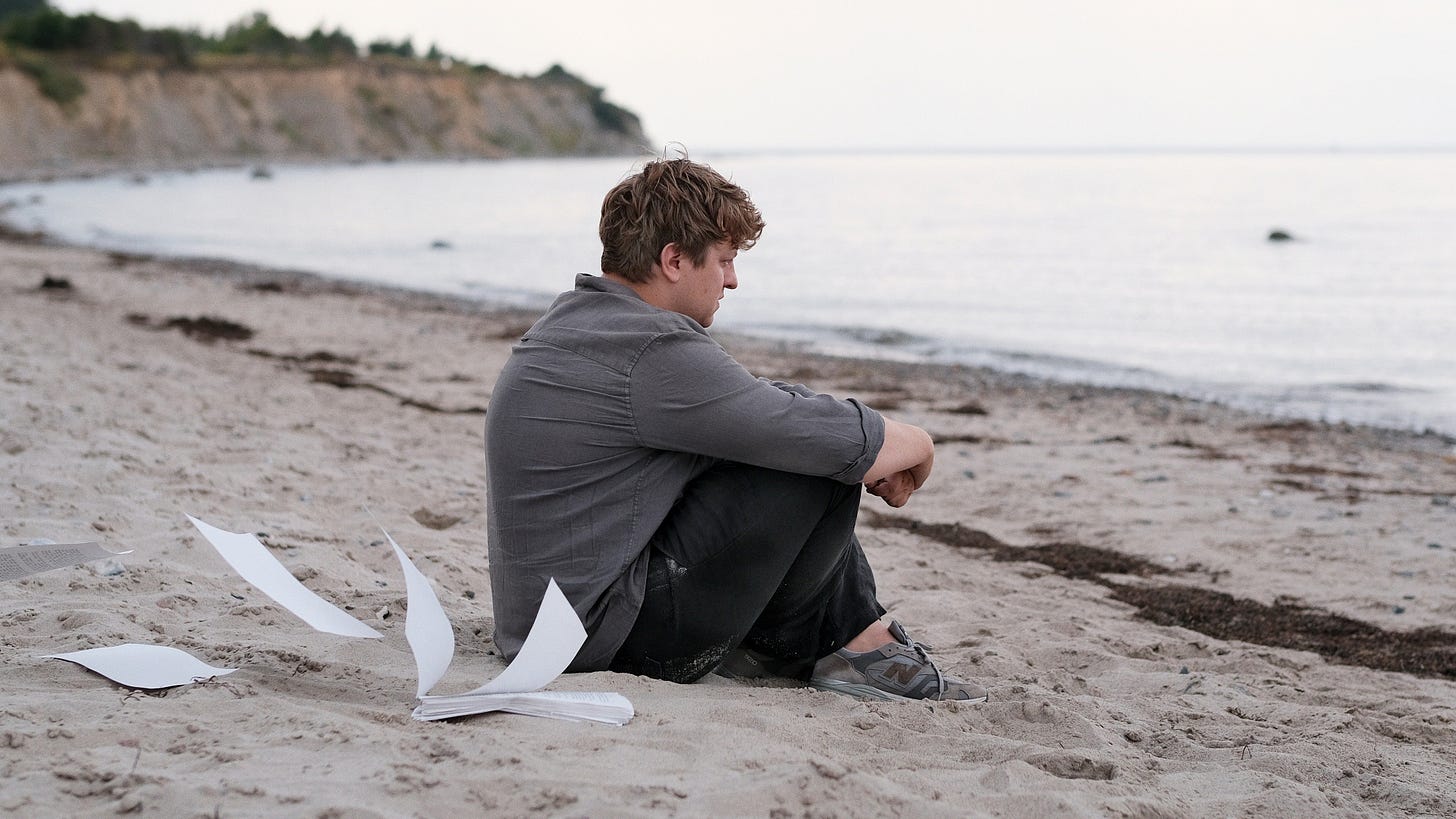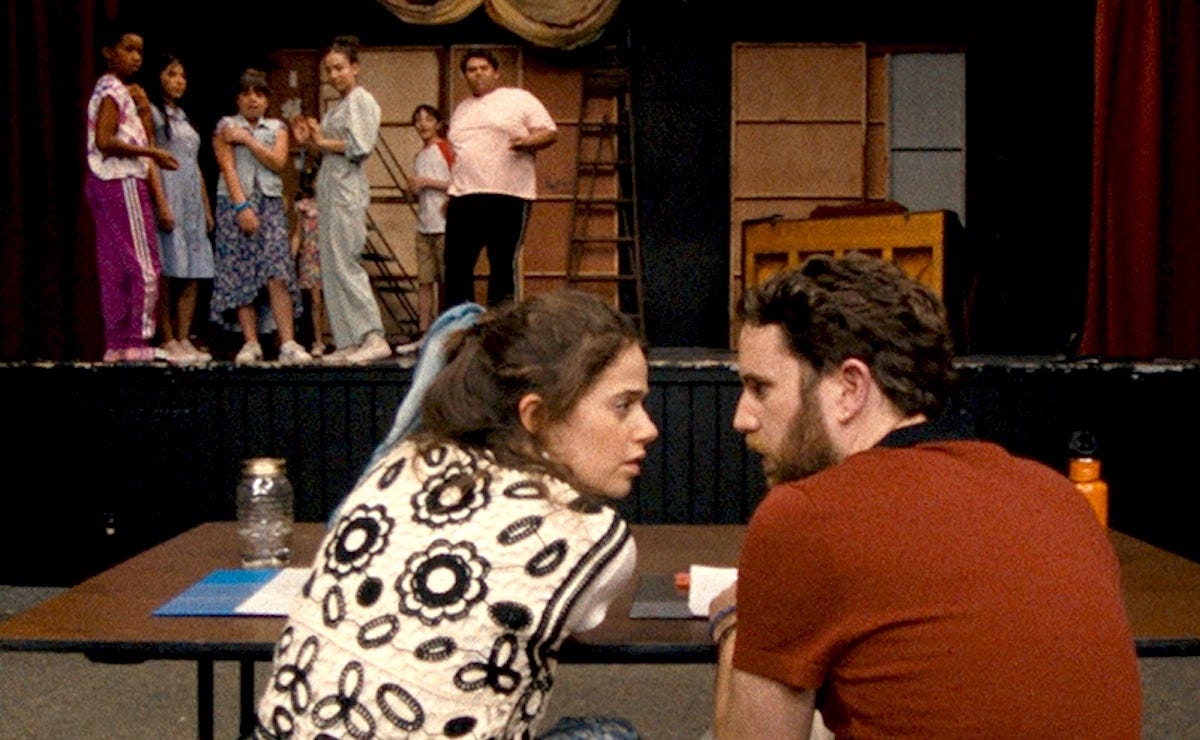In Review: 'Mission: Impossible — Dead Reckoning Part One,' 'Afire,' 'Theater Camp'
This week, Tom Cruise puts his life on the line for your entertainment, Christian Petzold builds a literary comedy around a dyspeptic writer and theater kids put on a show.
Mission: Impossible — Dead Reckoning Part One
Dir. Christopher McQuarrie
163 min.
By the time Dead Reckoning, the seventh of the eight announced installments of the Mission: Impossible franchise, ends with Part Two next year, it’s safe to predict that around five hours of screen time will be devoted to the efforts of the Impossible Mission Force (IMF) to stop an elusive and all-powerful A.I. force called “The Entity.” As it happens, The Entity is nicely timed with humanity’s own worries about the role A.I. might have in the workplace and society-at-large, and its implications are suitably murky for a Mission: Impossible plot, which seems even denser than usual this time out. Even the experts on screen are flummoxed by this technology, which seems intent at this stage to troll them or lure them into self-sabotage.
No matter. The paths through first part of Dead Reckoning can be as difficult or easy as you choose: You can either puzzle your way through the intrigue surrounding The Entity and the various parties scrambling for control over it, or you can simply see it as the quest for a very important key that unlocks a very important thing. That second reading seems closest to grasping the essence of what the Mission: Impossible series has become under Tom Cruise and a succession of talented directors, most recently Christopher McQuarrie, who made the previous two entries, Rogue Nation and Fallout, before taking on this two-part behemoth. All that really needs to be understood, in any of these films, is that some potentially world-ending whatsit is out there and Cruise’s Ethan Hunt—and the actor himself—is willing to put his body on the line to stop it.
After an opening sequence in which a Russian nuclear submarine loses a battle with a phantom threat, Ethan chooses to accept his latest mission, which involves traveling to the Namibian desert to track down one half of a special key associated with The Entity. The key is in the possession of Ethan’s longtime ally Ilsa (Rebecca Ferguson), who has a $50 million bounty on her head. From that dusty shootout, the film pivots back to IMF director Eugene Kittridge (Henry Czerny) and news that The Entity has infiltrated all digital systems while masking all traces of itself, achieving a potential sentience that could upend our web-based infrastructure. But if that sounds too complicated, no worries: Ethan and his team are still out key-hunting, which gets them involved with Grace (Hayley Atwell), a world-class pickpocket of unknown motivation.
The introduction of Atwell’s burglar gives Dead Reckoning a crucial spark, recalling the sleight-of-hand romance of Ernst Lubitsch’s Trouble In Paradise (and Mission: Impossible 2) where thievery becomes a form of flirting. While the Mission: Impossible franchise has become the gold standard for incredible stunts and practical effects, the sole lingering problem for the series is that it’s hard to separate one film from another. Titles like Ghost Protocol or Fallout or Rogue Nation are vague enough to where it’s easier to refer to them as “the one with the Burj Khalifa sequence” or “the one with the bathroom fight” or “the one where Tom Cruise hangs off an airplane during takeoff.” There’s enough spice in Ethan's relationship with Grace to give Dead Reckoning a “the one with” status beyond the action sequences, like when Ferguson turned up as an high-fashion Vienna opera sniper in Rogue Nation.
But who are we kidding? Dead Reckoning is the one with the motorcycle and the train and the blown-out bridge. Cruise continues to put his life on the line for cinema and McQuarrie and his technicians have the imagination and skill to make it seem simultaneously deft and dangerous. No one will ever outdo Buster Keaton death-defying acts in The General, but the real mission in Mission: Impossible is to make the best attempt and continue to beat back the threat of diminishing returns. The A.I. plot may be little more than the latest in IMF challenges, but it does feel like a bit of meta-commentary for Cruise and McQuarrie to fight against a future swallowed up by a faceless, remorseless, homogenous digital force. There’s still room for more artisanal pleasures. — Scott Tobias
Mission: Impossible — Dead Reckoning Part One is in theaters everywhere.
Afire
Dir. Christian Petzold
102 min.
Leon is a pill. There may be other circumstances in which he’s not a pill—he has acquired at least one friend and seems to have a solid relationship with his book publisher—but the idyllic Baltic retreat in Christian Petzold’s Afire is certainly not one of them. Leon (Thomas Schubert) and his buddy Felix (Langston Uibel) have arrived at this quiet spot with the intention of working on important projects, with Leon tackling another draft of his second novel and Felix devising a workable concept for an art-school photography portfolio. Felix is relaxed about his assignment, leaving himself plenty of time to splash around at the beach, but Leon grimly insists that he has work to get done. But when no one’s looking, he mostly whips a tennis ball against the side of the cottage like Jack Nicholson in The Shining, though with slightly less of a psychotic edge.
Even in a career that’s followed no obvious patterns—his trio of allusive political films (2012’s Barbara, 2014’s Phoenix, 2018’s Transit) is bookended by a riff on The Postman Always Rings Twice (2008’s Jerichow) and a mermaid romance (2020’s Undine)—Afire feels like an odd departure for Petzold, like his version of a Noah Baumbach literary comedy with a dyspeptic author at its center. (Critic and Reveal subscriber Mike D’Angelo compared Leon to the title character in Baumbach’s Greenberg, but the setting here is more Margot at the Wedding.) Though Afire turns on the wry irony that poor Leon is a novelist without the curiosity to observe anything or anyone around him, it’s not exactly a laugh riot, because his meltdowns are more petulant than witty.
And yet Afire is utterly absorbing all the same. The title comes from a wildfire that’s consuming the forest off in the distance, with the vague assurance that the sea winds will continue to push it away from Leon and Felix’s vacation home. With that Garden of the Finzi-Continis scenario in place—a metaphor for Leon’s narcissism that seems heavy-handed until it’s reframed brilliantly down the stretch—Petzold explores Leon’s relationship with an unexpected third housemate, Nadja (Paula Beer), who has a higher tolerance for his bullshit, though even she’s not without limits. Her interest in his manuscript flatters and agonizes him in roughly equal measure, though his failure to reciprocate that interest backfires about as badly as possible.
The raging wildfire portends the deus ex machina necessary to bring Afire to a close, but it’s a small relief that Petzold doesn’t attach it to a big theme like climate change. His film is more about the act of creating fiction out of people and events that have a complex and unknowable relationship to the author’s lived experiences. The only real trouble with Petzold’s artfully realized conceit is Leon himself, who isn’t quite the amusing, put-upon type the film believes him to be so much as a petty jerk who’s drawn oh-so-slowly out of his shell. This summer retreat changes him, perhaps into a better writer and a better person. That would be a more appealing draft. — Scott Tobias
Afire opens this week in limited release.
Theater Camp
Dir. Molly Gordon and Nick Lieberman
93 min.
A subplot plays out on the sidelines of Theater Camp, a new mockumentary co-directed by Molly Gordon and Nick Lieberman, that might mirror the experience of anyone who goes into the movie with a touch of skepticism. When Joan Rubinsky (Amy Sedaris), the founder of the upstate New York theater camp AdirondACTS, falls into a coma, keeping the camp alive is left in the hands of her crypto-bro son Troy (Jimmy Tatro as an only slightly more put-together goofus than the one he played on American Vandal). Having never understood the world in which his mom lived, he’s baffled and a little annoyed, but does his best to put his skills to work to save the place. The camp is filled with kids with outsized passions and a tendency to maintain their dramatic flair even after they leave the stage, a bunch of big personalities in little bodies completely alien to his world of influencer meatheads. Theater kids, in other words. It seems silly, even to someone comfortable calling himself an “enTroypreneur.”
Theater Camp’s counterpoint: it might be a very silly place, but it’s also an essential one. The film has deep roots in such silly, essential places. Gordon co-stars as Rebecca-Diane, a veteran counselor and lifelong friend and professional partner to fellow counselor Amos (Ben Platt). Lifelong friends and collaborators themselves, Platt and Gordon receive a screenwriting credit alongside Lieberman and Noah Galvin, who plays the introverted, much put-upon production manager/jack-of-all-trades Glenn. All veterans of camps and theater programs, their experience helps give the film a winning specificity. In an audition scene, kids trot out favorite, not-always-kid-appropriate numbers from Sweeney Todd and sing numbers from Waitress as if trying to reach the rafters. Off stage they call upon the spirit of Audra Macdonald. A subsection of “Fosse Kids” communicate via snaps and jazz hands. This is not the work of tourists.
Theater Camp is so fond of its world that it lacks even the bite of one of Christopher Guest’s gentle mockumentaries and the score sometimes underlines moments that would work better without it. But its heart never overshadows the humor. Fast-paced and consistently funny, the film is filled with memorable characters on both sides of the camp/counselor divide, though the kids often end up serving as foils for the grown-ups’ eccentricities. (“You are the oldest soul here. This is your last life,” the new age-y Rebecca-Diane tells one of her charges, whose expression turns to horror just before the camera cuts away.) A few overstretched moments aside, it makes every scene count. Ayo Edibiri doesn’t have that much screen time as Janet, a theater know-nothing who fakes her way into a position teaching mask work and stage combat, thanks to one of Troy’s cost-cutting measures, but everyone's completely winning. That’s also ultimately true of this knowing, warmhearted film that’s filled with inside jokes but welcoming to outsiders willing to laugh with but never really at the passionate weirdos working to preserve the one place where they know they make sense. —Keith Phipps
Theater Camp opens in select theaters Friday before expanding.











Saw M:I-DR1 just now in the very theater that Cruise and McQ popped up in last night. Alas, no famous guests (or much of anyone else, hallelujah) for a Wednesday morning screening. Liked it for the reasons, even though I thought I was watching Tatiana Maslany as the pickpocket for most of the film (she's even referred to as an orphan, heightening my confusion). I have the requisite amount of A.I. anxiety these days, so it came as something of a relief that this version has not yet transcended Ebert's Fallacy of the Talking Killer....
Bummer that AFIRE isn’t playing Chicago for another two weeks and that it’s only at the Siskel.